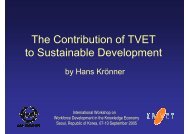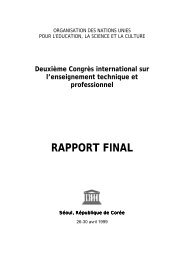Learning for Life, Work and the Future Initial ... - Unesco-Unevoc
Learning for Life, Work and the Future Initial ... - Unesco-Unevoc
Learning for Life, Work and the Future Initial ... - Unesco-Unevoc
You also want an ePaper? Increase the reach of your titles
YUMPU automatically turns print PDFs into web optimized ePapers that Google loves.
Page 70 Participants’ Papers <strong>Learning</strong> <strong>for</strong> <strong>Life</strong>, <strong>Work</strong> <strong>and</strong> <strong>the</strong> <strong>Future</strong><br />
• Grade 7, 9 <strong>and</strong> 12 leavers <strong>and</strong> dropouts<br />
• Retrenchees <strong>and</strong> retirees<br />
• Those who have never been to school<br />
• Zambians with special needs.<br />
Although <strong>the</strong> policy has since been implemented <strong>and</strong><br />
<strong>the</strong> Parliamentary Act is already in place, it has not<br />
been easy to increase access <strong>for</strong> all <strong>the</strong> target groups as<br />
indicated in <strong>the</strong> Policy document. The ones who benefit<br />
most are <strong>the</strong> Grade 12 school-leavers, despite <strong>the</strong><br />
fact that many people question <strong>the</strong> wisdom of recruiting<br />
a Grade 12 school-leaver.<br />
The equal opportunities philosophy has been very<br />
difficult to implement. For example, in most cases <strong>the</strong><br />
retirees <strong>and</strong> retrenchees only need retraining, but<br />
special courses <strong>for</strong> <strong>the</strong>m are not yet available: <strong>the</strong>re are<br />
only <strong>the</strong> structured two-year, two-<strong>and</strong>-a-half <strong>and</strong> threeyear<br />
programmes. The same situation exists <strong>for</strong><br />
women <strong>and</strong> those with special needs.<br />
As in many o<strong>the</strong>r countries today, it has been realised<br />
in Zambia that training should be dem<strong>and</strong>-driven. For<br />
many years <strong>the</strong> Government TVET institutions had<br />
been offering just full-time programmes that were developed<br />
a number of years ago <strong>and</strong>, until recently, <strong>the</strong><br />
system was very rigid, with no choices available. This<br />
situation is still prevalent in <strong>the</strong> institutions, although<br />
<strong>the</strong> situation is likely to change under <strong>the</strong> new policy.<br />
There are certainly not enough TVET programmes <strong>for</strong><br />
all those who need <strong>the</strong>m. This is a big problem which<br />
must be addressed sooner ra<strong>the</strong>r than later.<br />
5. Suitability of TVET Programmes<br />
As mentioned earlier, <strong>the</strong> 1996 policy on TVET<br />
emphasises dem<strong>and</strong>-driven training. This is important<br />
because, <strong>for</strong> a long time, many of <strong>the</strong> programmes<br />
were not appropriate, being completely at variance<br />
with what was happening in industry. For example,<br />
while Zambian industry is no longer using manual<br />
typewriters, many of <strong>the</strong> TVET institutions are.<br />
The importance of making TVET programmes appropriate<br />
cannot be over-emphasised. But to achieve this,<br />
innovative ideas like distance learning are needed so<br />
that courses can be offered to individual students without<br />
necessarily bringing <strong>the</strong>m to a traditional classroom.<br />
From <strong>the</strong> above, it is clear that Zambia, <strong>and</strong> indeed<br />
many countries in Sou<strong>the</strong>rn Africa, have had, <strong>and</strong> may<br />
continue to experience, <strong>the</strong> problem of access to<br />
TVET. Below are some possible solutions to this<br />
problem.<br />
6. Innovative Use of Facilities <strong>and</strong> Equipment<br />
In most of <strong>the</strong> countries in <strong>the</strong> sou<strong>the</strong>rn region, facilities<br />
<strong>and</strong> equipment at TVET institutions are <strong>the</strong> preserve<br />
of full-time students <strong>and</strong>, in most cases, inaccessible<br />
to those doing short courses or pursuing private<br />
studies. As equipment is expensive, it is not possible<br />
<strong>for</strong> many companies or individuals to set up <strong>the</strong>ir own<br />
workshops where private students can do practicals.<br />
It is <strong>the</strong>re<strong>for</strong>e important that <strong>the</strong> facilities <strong>and</strong> equipment<br />
provided by <strong>the</strong> state are made available to all,<br />
regardless of whe<strong>the</strong>r <strong>the</strong>y are full-time students or not.<br />
Even those registered as distance-learning students<br />
should be allowed to access <strong>the</strong> equipment provided in<br />
<strong>the</strong> TVET institutions. All that is required is proper<br />
timetabling.<br />
7. Equal Opportunities Policies <strong>and</strong> Practice<br />
With <strong>the</strong> adoption of equal opportunities policies <strong>and</strong><br />
practice, access to TVET can be truly open-guaranteed.<br />
It is true that many Sou<strong>the</strong>rn African countries have<br />
such admirable policies in place, but <strong>the</strong> difficult part<br />
is <strong>the</strong>ir implementation because of lack of resources.<br />
8. Range <strong>and</strong> Flexibility of Programmes to Suit<br />
All Target Groups<br />
In order to increase access to TVET <strong>the</strong>re should be a<br />
wide range of programmes on offer. These programmes<br />
should be flexible to suit all target groups.<br />
As is well known, TVET is <strong>the</strong> key to any industrial<br />
revolution. If <strong>the</strong> programmes are not flexible <strong>and</strong><br />
dem<strong>and</strong>-driven, <strong>the</strong>n <strong>the</strong> objective of developing a<br />
nation is unlikely to be achieved.<br />
Apart from full-time <strong>and</strong> part-time programmes, workshops<br />
<strong>and</strong> seminars, <strong>the</strong>re is one additional mode of<br />
training that must be taken seriously. I am happy to<br />
note that during <strong>the</strong> second International Congress on<br />
Technical <strong>and</strong> Vocational Education held in Seoul, in<br />
<strong>the</strong> Republic of Korea in April 1999, distance learning<br />
was one of <strong>the</strong> subjects discussed. In my view,<br />
distance learning, as many countries have realised, can<br />
offer a wide range of highly flexible programmes <strong>and</strong><br />
would definitely increase access to TVET.<br />
I am sure that those countries that have not started<br />
offering training using this innovative method will not<br />
need to re-invent <strong>the</strong> wheel as a few countries in<br />
Sou<strong>the</strong>rn Africa have enormous experience in this<br />
important area. We must learn from each o<strong>the</strong>r.<br />
9. How <strong>the</strong> Relevance of Programmes to <strong>the</strong> Local<br />
Economy Can Be Ensured<br />
Relevance of training programmes to <strong>the</strong> local economy<br />
is critical. To ensure this, all beneficiaries of<br />
training should participate in <strong>the</strong> design, implementation<br />
<strong>and</strong> monitoring of <strong>the</strong> programmes. There must be<br />
room to change <strong>the</strong> contents of a particular programme<br />
or programmes when appropriate. And both users <strong>and</strong><br />
teachers should be on <strong>the</strong> alert to ensure that only relevant<br />
programmes are offered.





